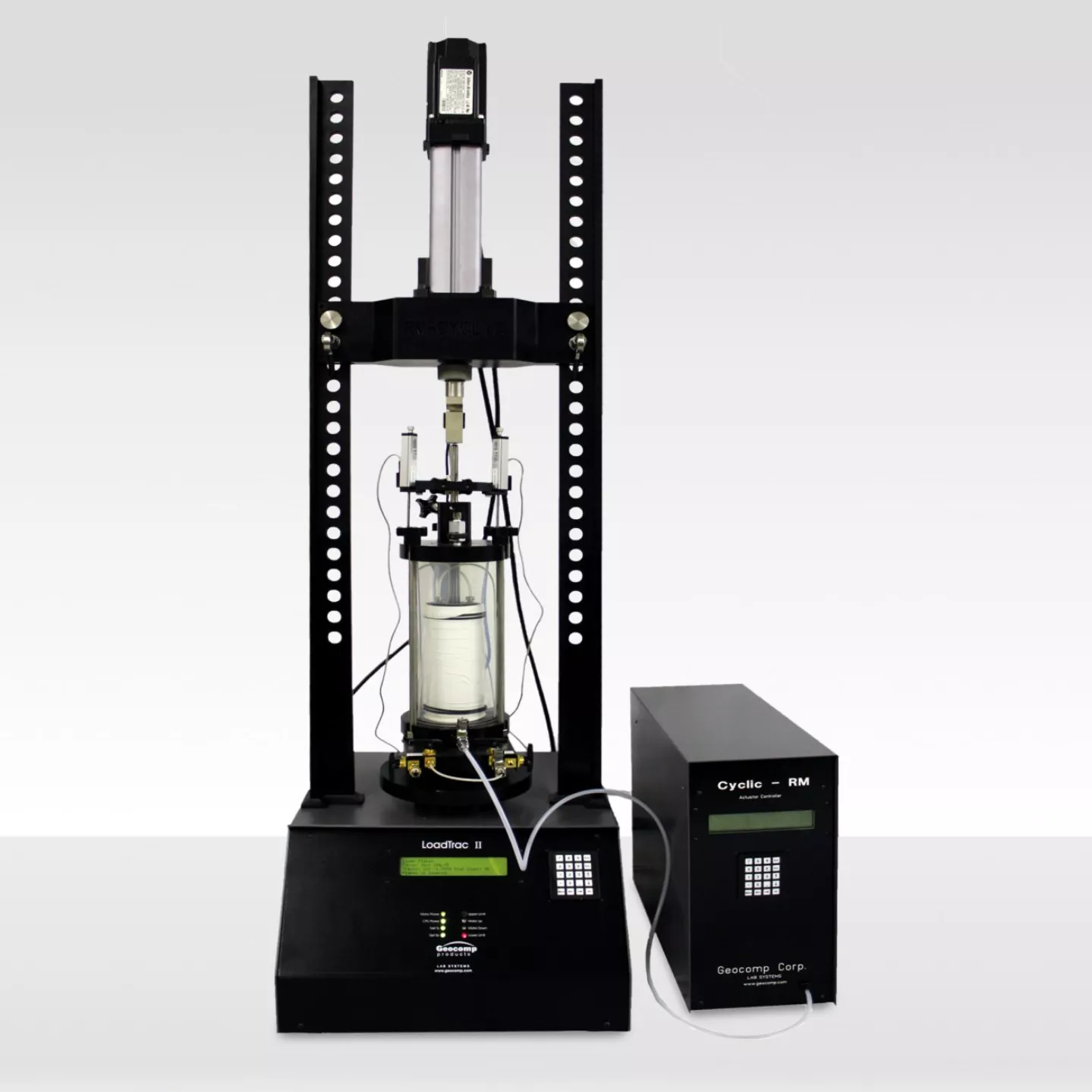- Soil Sampling
- Moisture Content In The Field
- Extruding Soil Samples
- Atterbergs Limits
- Particle-Size Distribution(Gradition)
- Triaxial Test Systems
- Compaction of Soil
- CBR Mould & Accessories
- CBR Test Machines
- In-Situ Density Tests
- Water Permeability
-
Advanced Soil Systems
- Fully-Automated Triaxial and Strees Path System
- Fully-Autometed Unconfined Compression System
- Fully-Automated California Bearing Ratio System
- Fully-Automated Constant Rate of Strain Consolidation System
- Fully Automated Consolidation & Swell System
- Fully-Automated Permeability System
- Fully-Automated Cyclic Trixial System
- Fully-Automated Resonant Column & Torsional Shear System
- Fully-Automated Resilient Modulus Unit
- Fully-Automated Direct Residual Shear System
- Fully-Automated Direct Simple Shear System
- Fully-Automated Cyclic Simple Shear System
- Fully-Automated Sheartrac III System
- Pinhole Test Apparatus
- Triaxial UU-CU-CD Test Systems
- Home ›
- Products ›
- SOIL ›
- Fully-Automated Resilient Modulus Unit
Fully-Automated Resilient Modulus Unit
Product Code
LoadTrac II-RM
Geocomp's LoadTrac II Resilient Modulus unit fully automates resilient modulus tests on base/subbase/subgrade materials. The LoadTrac II meets or exceeds all specifications for Resilient Modulus Testing of Base/Subbase/Subgrade Materials by AASHTO T-294/T-307 and SHRP Protocol P46. It minimizes man time during testing and offers a versatile platform for performing additional geotechnical tests.
User Features and Benefits
ADDITIONAL TESTING CAPABILITIES
Geocomp's load frame does more than just Resilient Modulus testing. With software and accessories, the following tests can also be done:
- California Bearing Ratio
- Compression Testing of Weak Rocks and Cement Mixtures
- Constant Rate of Strain Consolidation Testing
- Cyclic Triaxial Testing
- Incremental consolidation
- Triaxial Testing
- Unconfined Compression.
FULLY AUTOMATED MINIMUM INTERVENTION ON YOUR PART
The LoadTrac II performs resilient modulus tests from beginning to end according to the latest AASHTO standards without human intervention.
APPLIES AN ACCURATE LOAD THROUGHOUT TESTING
Resilient modulus testing is a complicated test in which the stiffness of the sample changes with loading. Since the performance of cyclic loading systems depends on the stiffness of the sample, most systems fail to apply the correct load throughout the test. Our system uses real-time adjustment of a PID controller to adjust the system control parameters as the stiffness of the specimen changes. This feature permits our system to apply an accurate load from the beginning to the end of the test. Our system meets the rigid AASHTO specs for precision on loading to a haversine shape.
OPERATES IN A WINDOWS ENVIRONMENT
Training time is short, as most people are familiar with the Windows operat- ing environment. Users can configure a wide variety of graphical screens to display the test results including tabular and graphical display of channel values with time, graphical display of stresses, strains, displacements and resilient modulus values.
TEST DATA...THE WAY YOU WANT IT
Our system generates data in a variety of formats, so users get the most use out of the data. Options include:
- A complete final test report with all appropriate calculations on the data and constitutive relationships based on Publication
- No. FHWA-RD-97-083
- A text file of raw data and a text file of data in engineering units. Either can be easily loaded into a spreadsheet for further data analysis. Complete reporting software is included. This software creates reduced test results that are printed in tabular and graphical form instantly after testing. Results are available in any set of units, regardless of which set of units the test was run. Geocomp's Resilient Modulus Testing System is efficient and reliable. Many details of the test cell, instrumentation and loading system have been optimized thorough inhouse testing on a wide variety of materials utilizing over fifteen years of R&D experience. We continually improve our systems based on new technology and the experiences of our customers.
Technical Specifications
Cell Pressure | Automatically applied, maintained and incremented with electro-pneumatic air pressure regulator |
|---|---|
Type Of Cyclic Loading | Haversine pulse |
Cyclic Rate | 0.1 sec per pulse, 1 pulse per second and any slower values given by user |
Cyclic Loading | • High performance custom linear actuator • 2.8kW peak, low inertia servo-drive system for fast response time. • High resolution feedback system for pre- cise and accurate control of load and speed. • 22 kN (5000lbs force) continuous load at speeds in excess of 200 mm (8") /sec • Self-contained and maintenance free • Single Phase 208 VAC/60Hz (US) / 220 VAC/50Hz (international) |
Options To End Test | Maximum number of cycles Maximum strain |
Reporting Options | • Shear stress versus pulse number • Axial strain versus pulse number • Resilient Modulus versus pulse number • Resilient Modulus versus deviator stress • Resilient Modulus versus confining stress • Automatic or user specified scaling on any of above plots • Plotting to monitor, printer, plotter, or file |
Test Cell | Modified triaxial cell with sample preparation accessories |
Unit Systems | U.S., English, metric and SI changeable at any time before, during and after test |
Sample Diameter | 70, 100, and 150 mm (2.8/4/6 inches) Custom sizes by special order |
Transducers | Force: 2, 5,10 kN (500, 1000, 2500 lbf.) Displacement: 0.5 inch range, +25.4 mm (+1.00 in.) Cell pressure: 0-500 kPa (0-70 psi) |
System Requirements | System is delivered complete to perform tests, store data, reduce data and report the test results. System will be calibrated and ready to begin testing immediately after installation. |
Documentation | Full documentation and user's manuals are provided. HELP screens are available at every point in all software |

 Français
Français English
English

